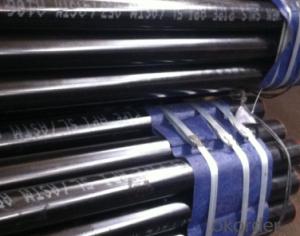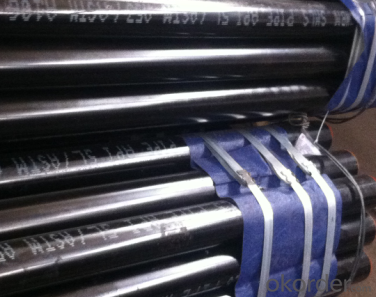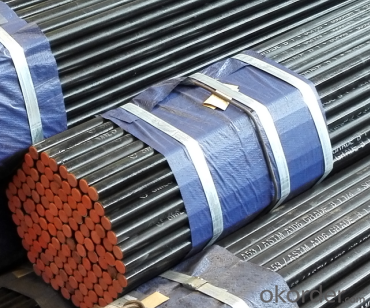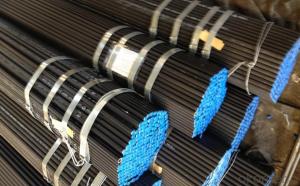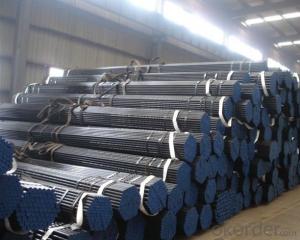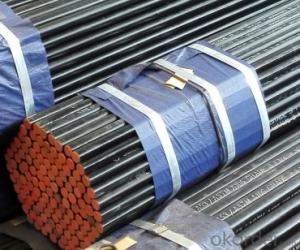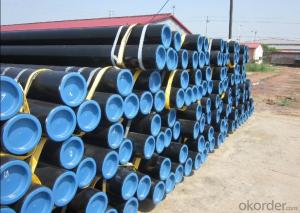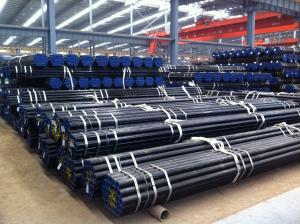CS Seamless Steel Pipe ASTM A53/ ASTM A106/ API
- Loading Port:
- China main port
- Payment Terms:
- TT OR LC
- Min Order Qty:
- 25 m.t.
- Supply Capability:
- 2500 m.t./month
OKorder Service Pledge
OKorder Financial Service
You Might Also Like
Product Description - CS SEAMLESS PIPE ASTM A53/ ASTM A106/ API 5L GR B:
Structure:
Seamless pipe is formed by drawing a solid billet over a piercing rod to create the hollow shell.
As the manufacturing process does not include any welding, seamless pipes are perceived to be stronger and more reliable.
Historically seamless pipe was regarded as withstanding pressure better than other types, and was often more easily available than welded pipe.
Main Features:
• High manufacturing accuracy
• High strength
• Small inertia resistance
• Strong heat dissipation ability
• Good visual effect
• Reasonable price
Specifications:
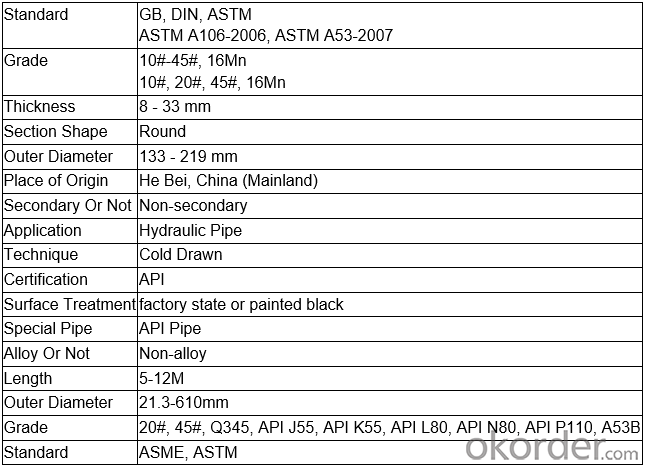
1) Material:20#(ASTM A 106/A53 GRB.API5LGRB,GB),45#,16Mn,10#.
2) Specification range:OD:21.3-610mm,WT:6-70mm,length:6-12m or according to the requirement of clients.
3) Excutive standards:GB,ASME API5L.ASTM A 106/A53,Despite of the above standards,we can also supply seamless steel pipe with standard of DIN,JIS,and so on,and also develop new products according to the requirements of our clients!
4) Surface:black lacquered,varnish coating or galvanized.
5) Ends:Beveled or square cut,plastic capped,painted.
6) Packing:bundles wrapped with strong steel strip,seaworthy packing.
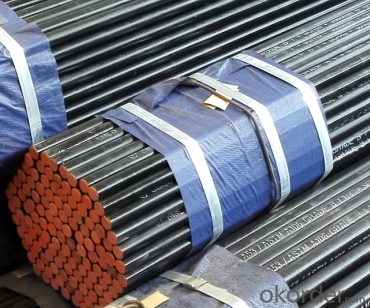
- Q: What is the role of steel pipes in the telecommunications industry?
- Steel pipes play a crucial role in the telecommunications industry as they are used for the installation of underground and overhead telecommunication cables. These pipes provide protection and support to the cables, ensuring their safety and longevity. Additionally, steel pipes are also used in the construction of communication towers and infrastructure, making them an essential component in establishing and maintaining reliable telecommunications networks.
- Q: Are steel pipes suitable for underground compressed air systems?
- Yes, steel pipes are suitable for underground compressed air systems. Steel pipes are known for their strength and durability, making them capable of withstanding the high pressure and potential corrosion that may occur in underground environments. Additionally, steel pipes are resistant to heat and can efficiently conduct compressed air, making them a reliable choice for such systems.
- Q: How are steel pipes used in water transportation?
- Steel pipes are commonly used in water transportation due to their durability and strength. They can be used for various purposes, such as carrying water from a source to a treatment plant, distributing water to different areas, and even for sewage systems. Steel pipes are highly resistant to corrosion and can withstand high pressure, making them ideal for long-distance water transportation.
- Q: Are steel pipes suitable for structural purposes?
- Yes, steel pipes are suitable for structural purposes. Steel pipes are known for their strength, durability, and versatility, making them an excellent choice for various structural applications. They can withstand heavy loads, provide excellent structural support, and are resistant to corrosion and extreme weather conditions. Steel pipes are commonly used in construction projects, bridges, buildings, and infrastructure systems such as water and gas pipelines. Additionally, steel pipes can be easily welded, bent, and cut to meet specific structural requirements, making them highly adaptable for different construction needs. Overall, steel pipes are widely recognized as a reliable and efficient choice for structural applications.
- Q: Can steel pipes be used for underground fuel pipelines?
- Indeed, underground fuel pipelines can utilize steel pipes for their construction. Steel pipes are widely favored for different pipeline applications owing to their exceptional durability, strength, and resistance to corrosion. In the case of underground fuel pipelines, steel pipes are particularly sought-after due to their capacity to endure significant pressure and fluctuations in temperature. Moreover, by shielding against external factors like soil shifts and chemical reactions, steel pipes offer exceptional safeguarding to the fuel transportation system, ensuring its safety and integrity. Through appropriate insulation and coating, the corrosion resistance of steel pipes can be further enhanced, solidifying their dependability as a choice for underground fuel pipelines.
- Q: What are the common problems or issues faced with steel pipes?
- Some common problems or issues faced with steel pipes include corrosion, leaks, blockages, and wear and tear. Corrosion can occur due to exposure to moisture or chemicals, leading to rust and weakening of the pipe. Leaks can arise from faulty connections or cracks in the pipe, resulting in water or gas leakage. Blockages can occur due to the accumulation of debris or mineral deposits, hindering the flow of fluids. Over time, steel pipes can also experience wear and tear, leading to erosion or cracks, which may require repair or replacement.
- Q: How are steel pipes used in oil and gas industry?
- Steel pipes are extensively used in the oil and gas industry for various purposes such as drilling, transporting, and processing oil and gas. They are primarily used as casing pipes, which provide structural support and prevent the collapse of boreholes during drilling operations. Steel pipes are also used for transporting crude oil and natural gas from the wellhead to processing facilities or distribution points. Furthermore, they play a crucial role in the construction of pipelines for long-distance transportation of oil and gas, ensuring efficient and reliable delivery. Additionally, steel pipes are utilized in the construction of oil and gas refineries and petrochemical plants for various processes, including fluid transportation, heat exchange, and storage.
- Q: How do you calculate the deflection of a steel pipe?
- To calculate the deflection of a steel pipe, you can use the formula for beam deflection, which takes into account the pipe's dimensions, material properties, and applied load. The specific equation you would use depends on the type of loading and support conditions. However, generally, you would need to determine the moment of inertia of the pipe cross-section, the modulus of elasticity of the steel, and the applied load to calculate the deflection.
- Q: Can steel pipes be used for conveying slurry?
- Indeed, steel pipes possess the capability to serve as a conveyance for slurry. In numerous industries, steel pipes find extensive usage in the transportation of diverse fluid varieties, including slurry. Slurry, a liquid containing suspended solid particles, is effectively accommodated by steel pipes due to their robustness, endurance, and corrosion resistance. The adeptness of steel pipes in managing such mixtures is further enhanced by their ability to handle high pressures and temperatures, rendering them suitable for conveying slurry in arduous applications like mining, dredging, and wastewater treatment. Moreover, the ease of welding steel pipes enables the construction of lengthy pipelines that efficiently facilitate the transport of slurry across considerable distances. Nonetheless, it is vital to consider the specific attributes of the slurry being conveyed, such as particle size, density, and abrasiveness, to ensure the selection and design of pipes that guarantee optimal performance and longevity.
- Q: What are the different types of supports used for steel pipes?
- The different types of supports used for steel pipes include pipe hangers, clamps, brackets, and anchors. Pipe hangers are used to suspend the pipe from a structure, while clamps provide support and prevent movement. Brackets are used to secure the pipe to a wall or other surface, and anchors are used to prevent the pipe from shifting or moving. These supports help to ensure the stability and proper installation of steel pipes.
Send your message to us
CS Seamless Steel Pipe ASTM A53/ ASTM A106/ API
- Loading Port:
- China main port
- Payment Terms:
- TT OR LC
- Min Order Qty:
- 25 m.t.
- Supply Capability:
- 2500 m.t./month
OKorder Service Pledge
OKorder Financial Service
Similar products
Hot products
Hot Searches
Related keywords
